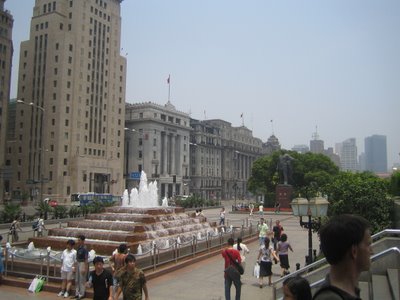Tuesday, June 20, 2006
Family vacation notes: Pictures from Shanghai
For those few of you who might be wondering what the United States would look like without the Clean Air Act, here's a photo of the new part of town, across the river from "the Bund," on a cloudless day:
The dingy smog reminds me a lot of Los Angeles 25 years ago.
The "Bund" -- a Hindi word that means "swamp," or something close to it -- is the stretch of land along the river ceded to the British for their trading companies. The Bund and the area behind it is the site of the only concentration of genuinely Western architecture in China.
I was last in China twenty years ago, and the changes are simply staggering. Shanghai, at least, is well on its way to becoming an affluent, consumer-driven city. There are nice shops all over the place, and Starbucks everywhere there are people with money:
Feeding frenzy!
Dragon!
Very tired. Time to crash.
5 Comments:
By Cassandra, at Tue Jun 20, 10:47:00 AM:
Great photos! Thanks so much for sharing them with us.
By Gateway Pundit, at Tue Jun 20, 01:08:00 PM:
Great pics. Have a great time.
By GreenmanTim, at Tue Jun 20, 10:27:00 PM:
TH, your image of smog-infested China and recognition that the absense of effective environmental regulation and safeguards is what makes it different from LA today is precisely why conservation should be considered a mainstream, bipartisan value, not "a personal virtue" as our Vice President has opined.
By Cassandra, at Wed Jun 21, 05:45:00 AM:
I used to live in the high desert in southern California.
We could stand up in the hills and literally see the smog coming up the funnel from LA. Many conservatives believe (I know I do) that government has to get involved with conservation/pollution measures to some extent b/c companies (and consumers!) don't pay the true environmental cost of production.
The problem, however, is that conservation is always going to amount to a tax on production, one way or another. The only question then becomes, do you allow some or all of that cost to be passed to consumers in the form of higher prices, or do you force higher income taxpayers to bear the burden? Or do you tax producers and risk hurting employment and the economy?
No matter what you do, someone will scream bloody murder :)
The fact is that air quality in LA used to be far worse, so I don't think even conservatives should argue against govt. intervention in this case.
By GreenmanTim, at Wed Jun 21, 10:13:00 PM:
Because conservation is always a question both of value and of values, any conservation policy, action or choice will have tangible and intangible costs and benefits. One such manifestation happens when a community with a modest tax base weighs the short and long-term implications of land coming off the tax rolls and going into permanent conservation ownership. Perhaps the loss of tax revenue on that formerly developable property concerns the town finance board today, but the cost in town services (school, police, fire) demanded by that land if it to be developed as residential is almost always far more than if conserved as tax exempt open space. The equasion gets harder in communities with lots of tax exempt land and a poor tax base, but still the cold hard math argues for using conservation land to offset the demands of increased residential development on municipal services.
Mind you, no decision about land is based on cold, hard logic alone. How we and other decision-makers feel about it, about the relationship with government and non-profits, about the changes in our communities, about what private property rights mean and about what limitations are reasonable to place on a landowner for the greater good, invariably trump land use planning based on the actual fiscal implications of any given proposal.
As for passing on the costs of conservation to the consumer, anyone who markets organic produce or green-certified timber knows that there are willing buyers -and in increasing numbers- that will pay a premium for these more ecologically sustainable products.
In a former life with The Nature Conservancy, I did a professional survey of local values and attitudes towards conservation in communities in two counties in upostate New York and oine each in adjacent CT and MA in 2001. The most astonishing finding was that even in the most conservative, politically right-of-center communities, a substancial majority of citizens would agree to an $18 injcrease in local property taxes to conserve open space, and the same held true, by smaler majorites, at $30. That is a strong indication that when people feel it is in their best individual and collective interest, they are willing to pay more for a better environment.



